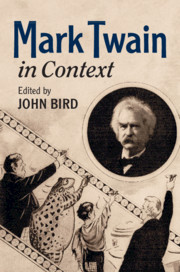Book contents
- Mark Twain in Context
- Mark Twain in Context
- Copyright page
- Contents
- Figures
- Contributors
- Preface
- Acknowledgments
- Chronology
- Abbreviations
- Part I Life
- Part II Literary Contexts
- Part III Historical and Cultural Contexts
- Part IV Reception and Criticism
- Chapter 29 Contemporary and Early Reception and Criticism (to 1960)
- Chapter 30 Reception and Criticism (1960 to Present)
- Chapter 31 Translation and International Reception
- Part V Historical, Creative, and Cultural Legacies
- Further Reading
- Index
- References
Chapter 29 - Contemporary and Early Reception and Criticism (to 1960)
from Part IV - Reception and Criticism
Published online by Cambridge University Press: 12 December 2019
- Mark Twain in Context
- Mark Twain in Context
- Copyright page
- Contents
- Figures
- Contributors
- Preface
- Acknowledgments
- Chronology
- Abbreviations
- Part I Life
- Part II Literary Contexts
- Part III Historical and Cultural Contexts
- Part IV Reception and Criticism
- Chapter 29 Contemporary and Early Reception and Criticism (to 1960)
- Chapter 30 Reception and Criticism (1960 to Present)
- Chapter 31 Translation and International Reception
- Part V Historical, Creative, and Cultural Legacies
- Further Reading
- Index
- References
Summary
It took some time for Mark Twain to be recognized as anything more than just another of the humorists of his time, although from the start, there were critics who recognized that he contained depth and substance that would make him last longer than his ephemeral comic peers. Significantly, William Dean Howells, writing in the influential Atlantic, saw in Twain an important writer to be reckoned with. The public were ahead of most critics in their appreciation of his work, and their letters to him bear witness to his power as a writer. In the early twentieth century, H. L. Mencken was a champion of Twain, although Twain received the same kind of backlash Howells received at the hands of a younger generation, notably Van Wyck Brooks, whose 1920 book The Ordeal of Mark Twain used crude Freudianism to argue that Twain was a comic genius who was censored and emasculated by William Dean Howells and by Twain’s wife. In 1932, Bernard De Voto answered Brooks in Mark Twain’s America, arguing for Twain’s artistry and creative vitality. In many ways, their argument set the tone for Twain criticism, especially in the decades that followed, but continuing even today. In the 1940s and 1950s, Twain’s critical reputation rose, with a number of important critics and scholars seeing in him greatness, elevating Mark Twain to the first rank of American writers.
- Type
- Chapter
- Information
- Mark Twain in Context , pp. 295 - 304Publisher: Cambridge University PressPrint publication year: 2020

